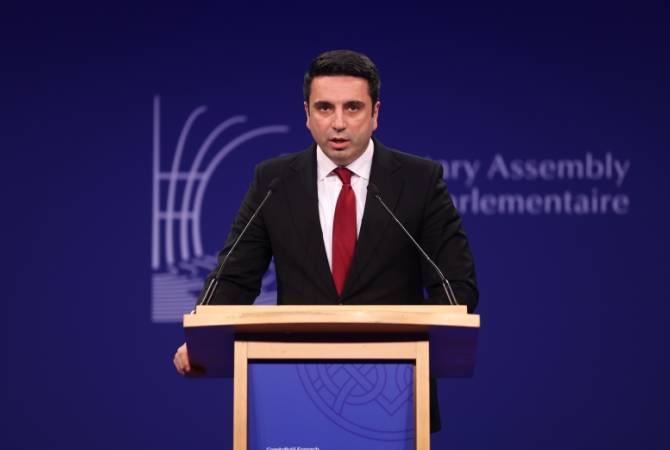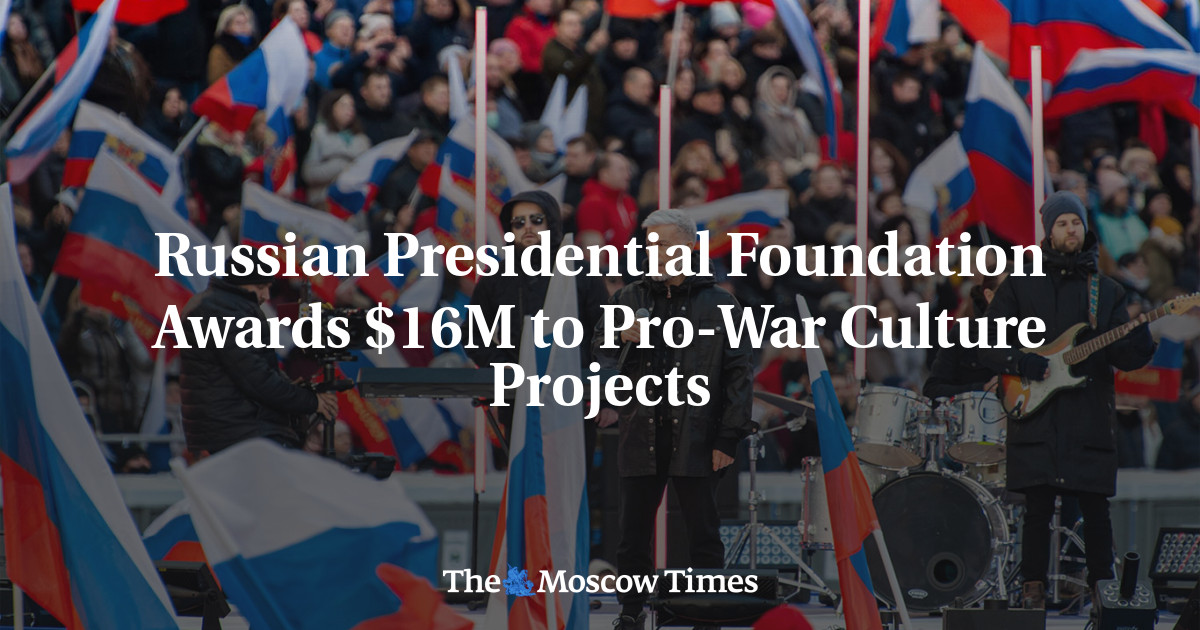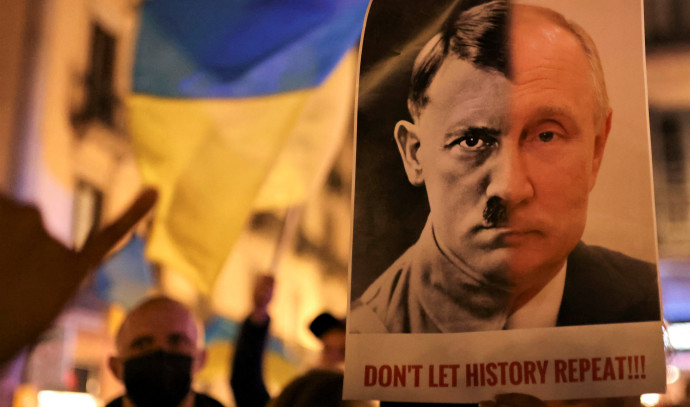More than 80 percnt of Nagorno-Karabakh's population flees amid Azerbaijan offensive posted at 19:39:40 UTC via pbs.org

YEREVAN, Armenia (AP) — The exodus of more than 80 percent of the population of Nagorno-Karabakh raises questions about Azerbaijan’s plans for the ethnic Armenian enclave following its lightning offensive last week to reclaim the breakaway region.
The Armenian government said Friday evening that more than 97,700 people, from a population of around 120,000, had fled to Armenia since Azerbaijan attacked and ordered the region’s militants to disarm. The enclave’s separatist government said it would dissolve itself by the end of the year after a three-decade bid for independence.
Some people lined up for days to escape Nagorno-Karabakh because the only route to Armenia — a winding mountain road — became jammed with slow-moving vehicles.
Armenian Health Minister Anahit Avanesyan said some people, including the elderly, had died while on the road to Armenia, because they were “exhausted due to malnutrition, left without even taking medicine with them, and were on the road for more than 40 hours.”
On Thursday, Armenian Prime Minister Nikol Pashinyan alleged that the exodus of ethnic Armenians from Nagorno-Karabakh amounted to “a direct act of an ethnic cleansing and depriving people of their motherland.” Azerbaijan’s Foreign Ministry strongly rejected Pashinyan’s accusations, saying the departure of Armenians was “their personal and individual decision and has nothing to do with forced relocation.”
NEWS WRAP: Ethnic Armenians flee Nagorno-Karabakh after Azerbaijan takeover
Laurence Broers, an expert on the Caucasus with the London-based think tank Chatham House, said it was unlikely that significant numbers of Armenians would remain in Nagorno-Karabakh and that “the territory will become homogenous.”
“If you define ethnic cleansing as actions by force or through intimidation to induce a population to leave, that’s very much what the last year or so has looked like,” he said.
During the three decades of conflict in the region, Azerbaijan and separatists inside Nagorno-Karabakh, alongside allies in Armenia, have accused each other of targeted attacks, massacres and other atrocities, leaving people on both sides deeply suspicious and fearful.
While Azerbaijan has pledged to respect the rights of ethnic Armenians in the region, most are now fleeing, because they don’t believe that Azerbaijani authorities will treat them fairly and humanely or guarantee them their language, religion and culture.
In December, Azerbaijan blocked the only road connecting Nagorno-Karabakh with Armenia, accusing the Armenian government or using it for illicit weapons shipments to the region’s separatist forces.
Armenia alleged the closure denied basic food and fuel supplies to Nagorno-Karabakh. Azerbaijan rejected the accusation, arguing that the region could receive supplies through the Azerbaijani city of Aghdam — a solution long resisted by Nagorno-Karabakh authorities, which called it a strategy for Azerbaijan to gain control of the region.
In the 1990s, the Azerbaijani population was itself expelled from Nagorno-Karabakh and hundreds of thousands of people were displaced within Azerbaijan. As part of its “Great Return” program, the government in Baku has already relocated Azerbaijanis to territories recaptured from Nagorno-Karabakh forces in a 2020 war.
Analysts believe Azerbaijan could expand the program and resettle Nagorno-Karabakh with Azerbaijanis, while stating that ethnic Armenians could stay or exercise a right to return in order to “refute accusations that Karabakh Armenians have been ethnically cleansed,” Broers said.
READ MORE: Dozens dead in gas station explosion as Nagorno-Karabakh residents flee to Armenia
A decree signed by the region’s separatist president, Samvel Shakhramanyan, cited a Sept. 20 agreement to end the fighting under which Azerbaijan would allow the “free, voluntary and unhindered movement” of Nagorno-Karabakh’s residents to Armenia.
Some of those who fled the regional capital, Stepanakert, said they had no hope for the future.
“I left Stepanakert having a slight hope that maybe something will change and I will come back soon, and these hopes are ruined after reading about the dissolution of our government,” 21-year-old student Ani Abaghyan told The Associated Press.
“I don’t want to live with the Azerbaijanis,” said Narine Karamyan, 50. “Maybe there are some people who will return to their homes. I don’t want that. I want to live as an Armenian.”
After six years of separatist fighting ended in 1994 following the collapse of the Soviet Union, Nagorno-Karabakh came under the control of ethnic Armenian forces, backed by Armenia. Then, during a six-week war in 2020, Azerbaijan took back parts of the region in the south Caucasus Mountains along with surrounding territory that Armenian forces had claimed earlier. Nagorno-Karabakh was internationally recognized as part of Azerbaijan’s sovereign territory.
Armine Ghazaryan, who crossed into Armenia from Nagorno-Karabakh with her four young children, told the AP that it was the second time she had been displaced from her home, saying she had previously sheltered with her children in her neighbors’ basement during the war in 2020.
“At least we live in peace here. At least we stay in Armenia,” she said upon arriving in the Armenian town of Goris.
On Monday night, a fuel reservoir exploded at a gas station where people lined up for gas to fill up their vehicles to flee to Armenia. At least 68 people were killed and nearly 300 others were injured, with more than 100 others still considered missing after the blast, which exacerbated fuel shortages that were already dire after the blockade.
On Friday the State Emergency Service of Nagorno-Karabakh’s interior ministry said 170 remains and body fragments had been collected and would be sent to Armenia for DNA identification.
Avanesyan, the Armenian health minister, said 142 people who were injured after the fuel tank exploded were taken to Armenia for treatment and that some of them were in very serious condition.
On Thursday, Azerbaijani authorities charged Ruben Vardanyan, the former head of Nagorno-Karabakh’s separatist government, with financing terrorism, creating illegal armed formations and illegally crossing a state border. He was detained on Wednesday by Azerbaijani border guards as he was trying to leave Nagorno-Karabakh for Armenia along with tens of thousands of others.
Vardanyan, a billionaire who made his fortune in Russia, was placed in pretrial detention for at least four months and faces up to 14 years in prison. His arrest appeared to indicate Azerbaijan’s intent to quickly enforce its grip on the region.
Another top separatist figure, Nagorno-Karabakh’s former foreign minister and now presidential adviser David Babayan, said Thursday that he would surrender to Azerbaijani authorities who ordered him to face an investigation in Baku.
Emma Burrows contributed to this report from London.
 14:32, 29 September 2023
14:32, 29 September 2023YEREVAN, SEPTEMBER 29, ARMENPRESS. The war in Nagorno-Karabakh revealed that autocratic regimes, based on the notion that “might is right,” often resolve conflicts through military force, bypassing international mediation, Speaker of Parliament Alen Simonyan said in his speech at the European Conference of Presidents of Parliament in Dublin.
“Today, our democracy continues to face numerous tests. It is endangered by external factors - none greater than military threats to our security and territorial integrity. Understandably, the constant threat of violence has a dire effect on the welfare of our society. Through its drumbeat of hateful, xenophobic rhetoric - accompanied by ultimatums and military aggression - Azerbaijan has created a toxic atmosphere and poisoned the peace process. Feckless responses from the international community have created in Azerbaijan a sense of impunity, worsening the situation in the region. Azerbaijani actions are not confined to Nagorno-Karabakh but extend to the sovereign territories of Armenia, some of which remain under Azerbaijan’s control. Azerbaijan’s approach is to impose its preferred solutions on Armenia through force. For over three years Azerbaijan has refused to return Armenian prisoners of war and other civilians, in defiance of a ruling by the European Court of Human Rights. Moreover, since the Court’s decision, Azerbaijan has kidnapped 2 Armenian soldiers from Armenian territory, bringing the total number of confirmed POWs to 35. I was not surprised that our Turkish colleague approved the use of military force against the Armenians of Nagorno-Karabakh. I am not surprised that Turkiye, Azerbaijan and Russia are often using the same rhetoric. What I am surprised for is that they are doing so here, at the organization that is founded for protection of human rights,” Simonyan added.
Kyiv has denounced Russian President Vladimir Putin’s diatribe that the West installed Volodymyr Zelensky, an “ethnic Jew, with Jewish roots, with Jewish origins” as Ukraine’s president to “cover up the glorification of Nazism” as antisemitic. The fact that ethnically, Russian, Ethiopian and Yemenite Jews are diverse, yet share the same heritage, is ignored by Putin’s grotesque classical antisemitic characterization of Jews that is evocative of Der Stürmer.
The dark ironies abound. Despite being accused of being a neo-Nazi plant, Zelensky has stated that his grandfather’s brothers were killed in the Holocaust. Just as Hitler dehumanized Jews before murdering them in his “Final Solution,” Putin uses the same tactics towards Ukraine resulting in him referring to the “anti-human essence that is the foundation of the modern Ukrainian state.”
Putin manipulates the memory of the Holocaust to justify committing ethnic cleansing and genocide to advance his imperialistic ambitions in Ukraine. As part of this strategy, Putin has repeatedly declared that Ukraine is not a real state and should be part of his Russian empire.
The Kremlin has resorted to distorting history and belittling the uniqueness of the Holocaust. In January, Russian Foreign Minister Sergei Lavrov justified Russia’s war on Ukraine by accusing the US of marshaling European countries to solve “the Russian question” in the same way that Adolf Hitler had sought a final solution to eradicate Europe’s Jews.
In his 2013 book, Anti-Judaism: The Western Tradition, David Nirenberg identified that antisemitism operates as a set of conspiracy theories that are based upon negative stereotypes of Jews that can be applied to any social or historical context. Whether it be the far right across Europe who fear the replacement of white Christians or the alt right in America that fear the influx of Middle Eastern, Central and South Americans, it is the Jews who are vilified for plotting immigration and demographic changes to target white Christians. Facts are deemed incidental to the conspiratorial worldview where antisemitism festers.
A U.S. State Department dossier on Russian disinformation will feature this photo of Ukraine President Volodymyr Zelensky at the Western Wall in Jerusalem, Jan. 23, 2020. (credit: OFFICE OF UKRAINE PRESIDENT)On February 27, 2022, three days into Russia’s invasion of Ukraine, hundreds of the world’s leading historians and scholars of Nazism and the Holocaust signed a statement: “We strongly reject the Russian government’s... equation of the Ukrainian state with the Nazi regime to justify its unprovoked aggression. This rhetoric is factually wrong, morally repugnant and deeply offensive to the memory of millions of victims of Nazism and those who courageously fought against it.”
None of the new set of Russia’s elites who guaranteed their wealth by maintaining political ties with Russian President Vladimir Putin or the old set of Russian oligarchs that acquired wealth in the aftermath of the Cold War but who have since divested any interest in Russia have strongly repudiated Putin’s antisemitic rhetoric and minimization of the Holocaust.
This extends to the former president of the European Jewish Congress (EJC), Moshe Kantor who is close to Putin and who the EJC ironically lobbied for him not to be sanctioned by the US and to be removed from the EU’s sanctions list. It would be worthy of satire had it not been tragic that the EJC’s rationale is that sanctioning Kantor would cause the destruction of European Jewish life.
Should Europe’s Jewish life be secured by finances provided by Putin? As has been reported, Kantor is a major shareholder in Russian fertilizer firm Acron, which the UK said provides “vital strategic significance for the Russian government” as it enables Putin to circumvent sanctions and contribute financially to Russia’s war effort in Ukraine.
Antisemitic sentiment popular in Russia
Moreover, should European Jewry be traded for Russia’s Jewish life as Putin’s antisemitic rhetoric is fostering antisemitism in Russia? In 2018, a survey conducted in Russia found that 14% of Russia’s population did not want to have Jews as their fellow citizens. This was compared with 5% in Ukraine. In 2022, Putin threatened to close the offices of the Jewish Agency that was responsible for maintaining Russia’s Jewish communal life for its roughly 150,000 Jews and that had facilitated a mass exodus of nearly one million Jews that emigrated to Israel.
There were 86 members of my family who perished in the Holocaust’s slaughter of six million Jews. I find it shameful for their memory to be distorted by Putin’s attempt to commit genocide in Ukraine today. It is incredibly cynical for Putin’s oligarchs to avoid being sanctioned by associating themselves with the well-being of European Jewry while enabling Putin to circumvent sanctions. Furthermore, failing to decry Putin’s antisemitic pronouncements is to enable him to promote greater antisemitism in Russia and slaughter innocent civilians in Ukraine.
The silence in the face of Russian atrocities in Ukraine runs contrary to Elie Wiesel’s oft mentioned maxim that the Holocaust must make us sensitive to the plight of others. To be silent at false historical equivalences created between the Holocaust and Russia’s conflict in Ukraine in which Putin advances ethnic cleansing and genocide for his own imperialistic ambitions is to do the exact opposite.
The writer is a board member of the United States Agency for International Development’s (USAID) Partnership for Peace Fund and former president of the Advisory Board for the Institute for the Study of Global Antisemitism & Policy (ISGAP).

President Vladimir Putin’s cultural support foundation has awarded 1.6 billion rubles ($16.4 million) to arts and culture projects that drum up support for the war in Ukraine.
Russia’s Presidential Foundation for Cultural Initiatives on Thursday announced 303 winners of its annual competition for receiving state funding, with projects including music festivals featuring songs about the war in Ukraine, patriotic-infused art installations and a movie about a pro-Russian separatist leader.
“Mirnyi Atom” (“Peaceful Atom”), a detective TV series about a Russian engineer who travels to the occupied Zaporizhzhia Nuclear Power Plant, won the largest grant of 49 million rubles ($500,000).
The creators of “Mirnyi Atom” said they hope to show the TV series in schools across Russia.
The second largest grant was awarded to a music production studio for “new patriotic talent,” which secured funding of 23 million rubles ($235,000).
Journalists have previously reported on the Presidential Foundation for Cultural Initiatives turning into a honeypot for performers and propagandists who are ready to promote the war, with over a billion rubles awarded in last year's award competition.
Putin established the foundation in 2021 to offer state financial support to non-profits, companies and projects in arts and culture.




Comments
Post a Comment